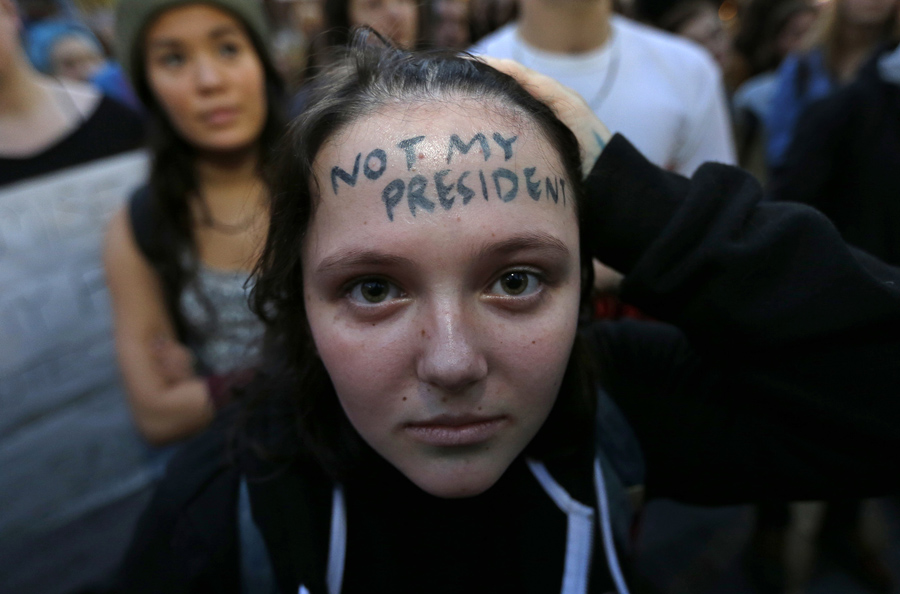 |
Photo: The Nation "Clair Sheehan...on November 9, 2016, in downtown Seattle" Ted S. Warren / AP
|
In these dark times of crony capitalism destroying life support on the planet, many of us who have been actively resisting for some time wonder what to do. Keep marching? Go underground? Seek out more beloved communities and link arms amid the gloom?
It may be fitting that in the dark days before the winter solstice many of us turn to reading to inform our sorrow and help us cogitate on actions that may or may not suit the times.
In this spirit I created a recent post with recommended sources for news and analysis. Today I share a recommended reading list compiled by my sister peace activist Dixie Searway :
At the end of a recent rant I mentioned sharing a reading list to anyone interested. I just got back to doing that so here goes, a list of readings that were transforming for me and perhaps would be interesting for others.
When I began my personal reading binge I was focused on 9/11 so I began with the Commission Report and books by David Ray Griffin and Peter Dale Scott. Today I would recommend starting with subjects, authors listed below.
On Federal Reserve and its history:
1. A Study Of The Federal Reserve And Its Secrets by Eustace Clarence Mullins: describes, names participants who traveled to Jekyl Island to write legislation that would eventually be passed by President Wilson establishing the Federal Reserve Act of December 23, 1913.
2. The Creature from Jekyl Island: A Second Look at the Federal Reserve by G.Edward Griffin is a good resource book on the subject.
3. Web of Debt: The Shocking Truth About Our Money System And How We Can Break Free by Ellen Hodgson Brown was the best book for helping me to understand economics, effects of banking systems in US history. She uses quotes throughout her book from the fairytale The Wizard of Oz published by L.Frank Baum, 1900 which really was an allegory describing the issues of that time. Her quotes, examples from the wizard of Oz story helped me, a novice, to understand the concepts and events of our economic history with its ups and downs of trying to get out from under the influence of the banks, only to be captured again. It is an amazing read! Changed my perspective, life.
On the IMF and World Bank, what they are, what they do, and the effects all over the world:
1. The Globalization of Poverty and The New World Order by Michel Chossudovsky is an amazing thorough world overview. Chossudovsky was a young professor of economics in Chile when the military coup began and later saw similar happenings while teaching in Argentina, both affecting him greatly and thus began his life's work and this book. One understands the world differently and the role of IMF and the World Bank after reading and seeing how oppressive policies have been enacted all over the world through banking systems purported to help struggling countries.
2. Confessions of an Economic Hit Man; The Secret History of the American Empire, The Truth About Economic Hit Men, Jackals, And How To Change The World by John Perkins are two books that take Chossudovsky's intellectual work and show us the nitty gritty, down to earth oppressive activities that take place on the ground. If a leader can be bought with monies the corporations come in followed by the debt which can not be repaid. If the leader can't be bought, they are assassinated, die in a plane crash or are displaced by a coup. It is not a pretty picture, but incredibly important to understand. Perkins' books are a must first read, and he has a new edition out now.
On wars, the effects on veterans, and observations, documentations of atrocities in third world countries made by veterans during the Reagan years:
1. Blood On The Tracks: The Life And Times Of S. Brian Willson by S. Brian Willson is a soul changing book, again like John Perkins, making clear what happens on the ground in this case The Vietnam War, but very important for me, because I didn't have the picture of the overt and covert wars the US was conducting in the 80's in Central America. This book is distressing reading, creating dissonance no matter one's knowledge before, and yet one of the most important readings for me personally influencing how I view the world. One is left really feeling at one's core that we are in truth brothers and sisters with everyone in the world.
On people, presidents, government agencies critical to understanding how our country has developed since WWI, WWII:
I would start with just four authors. I know there are more.
1. JFK and the Unspeakable: Why He Died And Why It Matters by James. W. Douglas.
2. The Devil's Chessboard: Allen Dulles, The CIA, The Rise of America's Secret Government by David Talbot.
3. The American Deep State by Peter Dale Scott. If you are like me you will end up purchasing, reading every book of his you can, including his poetry! As a Canadian who has lived, worked in the US, he is an American treasure!
4. Family of Secrets, The Bush Dynasty, America's Invisible Government, and the History of the Last Fifty Years by Russ Baker fills in a great deal.
On social, cultural commentary:
I have found Chris Hedges, especially his Empire of Illusion: The End of Literacy and the Triumph of Illusion to be very thought provoking.

No comments:
Post a Comment
Because of a deluge of spam, I have had to switch to moderated comments. Sorry for the inconvenience.